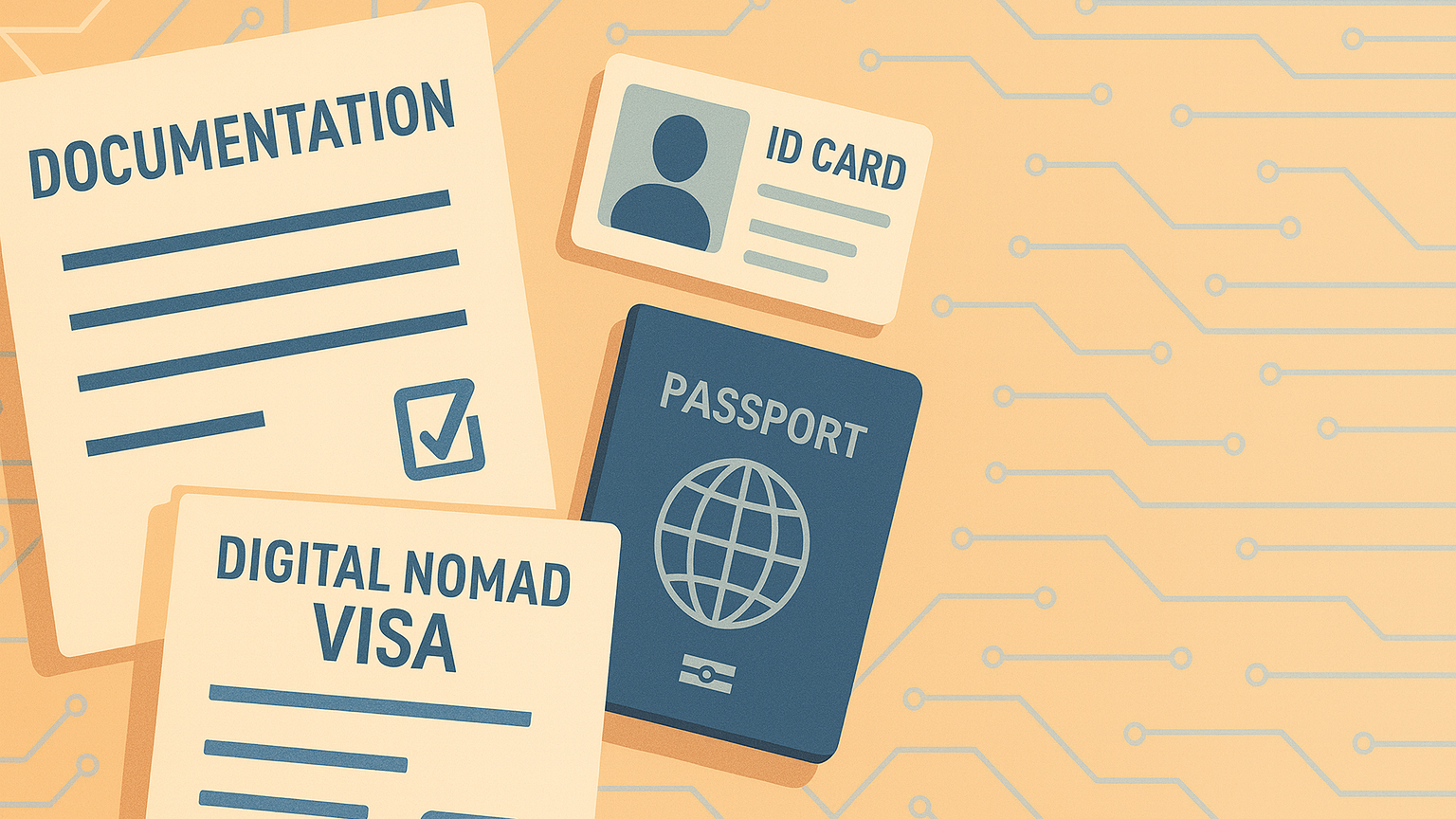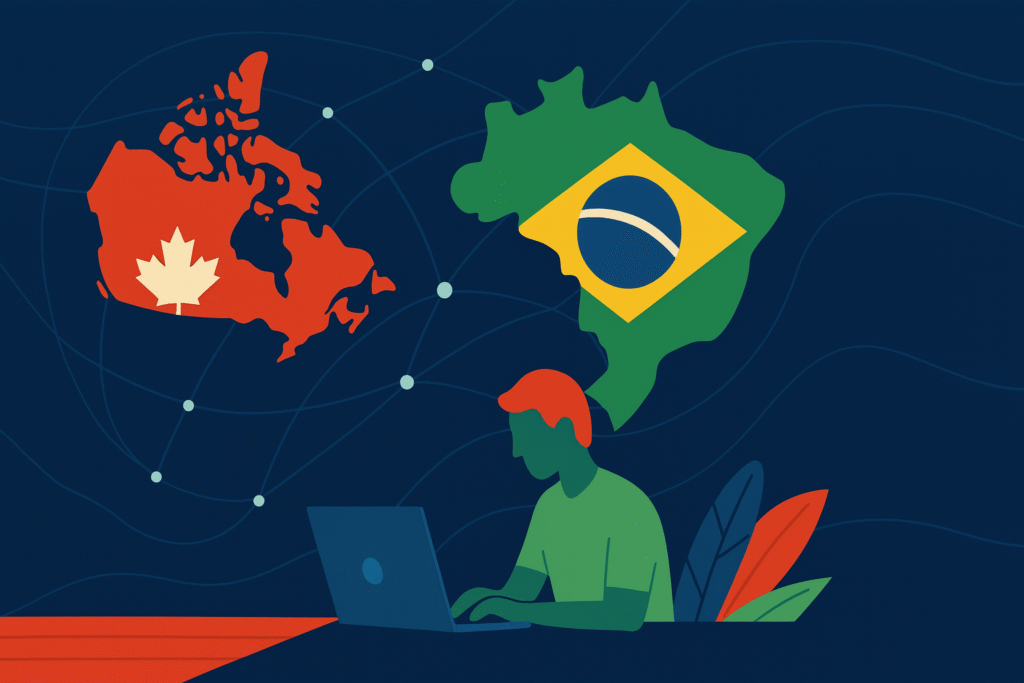The idea of living and working remotely has exploded since the pandemic, and Canada has seen a surge of workers who now want to travel while maintaining their jobs. A digital nomad uses technology to work from anywhere with an internet connection. Brazil’s digital nomad visa (Vitem XIV) opens South America’s largest country to remote workers. This article focuses on Canadians because they make up a large portion of people who apply for this visa and need to understand the requirements and proof of income needed to qualify. Brazil’s visa is accessible to citizens of the United States, Canada and Europe, but applicants must show evidence of sufficient funds and maintain employment outside Brazil.
What is Brazil’s digital nomad visa?
Brazil’s Vitem XIV is a temporary residence permit issued to foreign digital nomads who work remotely for a foreign employer or as freelancers. The visa is granted for up to one year and may be extended once in Brazil. Applicants cannot have a contract with a Brazilian company. These preconditions prevent competition in Brazil’s domestic labor market. Retirees or pensioners may also qualify if they can prove regular income.
Eligibility criteria and criteria
To qualify, those from Canada must provide a valid passport, recent photo, online application form, travel itinerary, criminal background check, birth certificate and health insurancegov.br. You must demonstrate that you are a digital nomad through a declaration of remote work, a contract or service agreement with a foreign employer and financial proof meeting the minimum thresholdgov.br. Documents often require translation into Portuguese and an apostille, so plan ahead. The Federal Police grants residence authorization when you arrive in Brazil.
Proof of income – demonstrating financial capacity
The income evidence requirement is central to the visa. You must earn at least US$ 1,500 per month or hold US$ 18,000 in savings. Based on August 2025 exchange rates, US$ 1,500 equals roughly R$ 8,206 or €1,291, and US$ 18,000 is about R$ 98,476 or €15,492. Provide bank statements, pay slips or contracts showing you meet these thresholds for several months. Upload digital copies through the online portal and bring originals to your consular appointment.
Application process for people from Canada

Preparing your dossier
Gather your documents early. Obtain a criminal record check from the RCMP, have it apostilled or authenticated by Global Affairs Canada and translated into Portuguese. Ensure your passport is valid for at least six months beyond your stay. Print your travel itinerary, prepare your birth certificate and secure health insurance that covers you in Brazil. If you reside outside Canada, request documents from your local authorities accordingly.
Submitting the online application
Applications are submitted through Brazil’s electronic visa portal. Create an account, upload documents and select the nearest consulate (Vancouver, Toronto or Montréal). After submission, print and sign the application receipt. Pay the visa fee at the consulate; fees differ by location but are roughly US$ 100 (≈ R$ 543, €86). Check consulate websites for precise amounts.
Consular appointment and biometrics
Consulates will review your file and contact you to schedule an interview. Bring your original documents and copies. Officers may ask about your remote work and plans in Brazil and verify your income threshold. Processing time takes at least five business days. Plan your travel accordingly.
Arrival in Brazil and registration
After receiving your visa, travel to Brazil and register with the Federal Police within 90 days. Bring your passport, visa, tax identification number (CPF) and proof of residence. Registration yields the Registro Nacional Migratório card required for banking and housing.
Cost of living and budgeting for location‑independent professionals in Brazil
Overview of living costs
Understanding local costs helps you plan your stay. Numbeo estimates a single person’s monthly costs in Rio de Janeiro, excluding rent, at R$ 3,258, and a family of four at R$ 11,401.3. These amounts equal about US$ 596 / €513 and US$ 2,086 / €1,845. Rio is around 10 % cheaper than São Paulo, and rent is 24 %. Common expenses include meals at inexpensive restaurants (approx. R$ 40, US$ 7.36, €6.31) and monthly public transport passes (R$ 190, US$ 35, €30). One‑bedroom apartments cost around R$ 2,500 (US$ 460, €396) in the city center or R$ 1,700 (US$ 313, €268) outside. Utilities and internet add roughly R$ 400 (US$ 74, €63). Because Brazil is generally more affordable than Canada, meeting the visa’s income threshold ensures you can comfortably cover expenses.
Financial planning
Budget for health insurance (R$ 500, US$ 92, €79 per month), a buffer for travel and an emergency fund of about R$ 10,000 (US$ 1,840, €1,576). Open a Brazilian bank account when you obtain your RNM to minimize conversion fees and consider using international cards with low foreign transaction charges.
Climate, geography and practical considerations
Climate and seasons
Most digital nomads choose coastal cities. Rio de Janeiro’s average high in January is 31 °C (88 °F) and the low is 24 °C (75 °F); July–August averages drop to 25 °C (77 °F) high and 19 °C (66 °F). Pack lightweight clothing and a rain jacket for tropical showers. Hydrate and take precautions against intense sun. Major cities operate on Brasília Time (UTC –3). This is one hour ahead of Toronto in summer and two hours ahead in winter.
Connectivity and working conditions
Urban internet speeds of 200–500 Mbps cost R$ 100–150 (US$ 18–28, €16–24) per month. Mobile data packages with 10 GB cost about R$ 50 (US$ 9, €8). Coworking spaces start around R$ 500 (US$ 92, €79) per month and provide reliable workspaces and networking opportunities. Learn basic Portuguese phrases to ease daily interactions and support.
Healthcare and safety
Private health insurance offers better coverage than the public system. Register with the Government of Canada’s “Registration of Canadian citizens Abroad” for safety updates. Avoid displaying valuables, use licensed transportation and stay informed about local conditions. Choosing safe neighborhoods like Ipanema or Leblon enhances security.
Tax and legal considerations
Understanding Brazilian tax rules
You become a tax resident if you spend more than 183 days in Brazil within 12 months or obtain a permanent visa. Tax rates range from 7.5 % to 27.5 % depending on income. Digital nomads may avoid residency by limiting time in Brazil or maintaining tax residency elsewhere; consult a cross‑border tax professional to navigate Canadian and Brazilian obligations because there is no bilateral tax treaty. Keep records of time spent in each country and seek advice on structuring contracts.
Visa renewal
The remote professional visa lasts one year and can be renewed once. Renewal requires updated documents, including proof of income. Overstaying can lead to fines and future travel restrictions. If you decide to stay long‑term, explore other visas like investment or retirement options, each with distinct conditions.
Cultural tips and travel experiences
Embrace Brazilian culture
Brazilians are known for their warmth. Learning Portuguese—even a few phrases—improves daily life. Social customs include greeting with a kiss on the cheek and relaxed timekeeping for social events. Join language exchanges or local sports clubs to build community.
Exploring and festivals
Brazil’s size offers varied experiences: beaches, rainforest and waterfalls. Weekend trips from Rio include Ilha Grande and Paraty. The country spans roughly 4,395 km (2,730 mi) north‑to‑south and 4,319 km (2,683 mi) east‑to‑west. Carnaval occurs in February or early March and features parades that range from R$ 150 (US$ 27, €24) to R$ 1,000 (US$ 184, €157) depending on seating. Football matches, New Year’s celebrations and local festivals give insight into Brazilian culture. Canadian nationals often network at coworking events, sports clubs and language meet‑ups.
Digital nomad communities and working culture
Beyond paperwork and budgets, Canada’s globetrotters thrive when they connect with like‑minded people. Brazil hosts growing digital nomad communities in cities like Florianópolis, São Paulo, Salvador and Recife. These hubs offer a blend of beachfront living, reliable internet and cultural vibrancy. In Florianópolis, co‑working spaces such as Impact Hub and Selina attract citizens of Canada and Europeans who collaborate on projects and socialise after work.
São Paulo’s Vila Madalena and Pinheiros neighbourhoods boast cafés with robust Wi‑Fi and creative vibes. Many expatriates join online communities on Facebook and Meetup dedicated to digital nomads in Brazil where members share tips on finding accommodation, navigating visas and meeting the prerequisites of the Vitem XIV. Networking can lead to job referrals and friendships that ease the transition to a new country.
The Brazilian workday typically starts later than in North America. Lunch breaks can last one to two hours, and social interaction is valued. those from Canada may need to adapt their schedules, especially when working with colleagues across multiple time zones. Coworking memberships often include networking events, seminars and group activities. For digital nomads seeking a balance of work and leisure, Brazil offers yoga classes on the beach, surfing lessons and samba nights after office hours. Engaging in local activities fosters integration and helps maintain work‑life balance, a key element of a successful remote career.
Common mistakes and how to avoid them
Another common mistake is misunderstanding how to present income threshold: ensure that your statements explicitly show amounts exceeding US$ 1,500 per month or savings above US$ 18,000. Applicants occasionally overlook critical requirements. One frequent error is submitting an incomplete criminal record check or failing to get it properly apostilled. Some Canadians submit bank statements that do not cover the necessary months or fall below the financial documentation threshold, leading to delays.
Others neglect to translate documents into Portuguese. To avoid these pitfalls, create a checklist of all requirements and review them before submitting your application. Engage a certified translator familiar with consular specifications. Ensure your bank statements clearly show your name and consistent income above US$ 1,500 per month or savings above US$ 18,000. If your income fluctuates, provide additional evidence such as contracts or tax returns.
Another mistake is underestimating processing time. Although official guidelines mention a minimum of five working days, some consulates take several weeks due to high demand. Canadians planning to leave at a specific date should submit their applications well in advance and avoid booking non‑refundable tickets until their visa is approved. Misunderstanding the residence registration requirement is another issue; failing to register with the Federal Police within 90 days can result in fines and jeopardise future visa renewals. Stay informed by reading consulate updates and joining expat forums where digital nomads share recent experiences.
Considerations for Americans and Europeans
Although this guide focuses on Canadians, citizens of the United States and Europe apply through similar processes. U.S. applicants can schedule appointments at consulates in cities like San Francisco, New York and Miami. Europeans apply at Brazilian consulates in their respective countries.
The requirements remain the same: proof of a valid passport, health insurance, a remote work contract and income threshold meeting the threshold. However, processing fees may differ. For example, U.S. consulates often charge visa fees equivalent to US$ 160, whereas European fees are calculated in euros. U.S. citizens should also be aware of the Foreign Account Tax Compliance Act (FATCA), which requires reporting of foreign bank accounts. Europeans must check whether their countries have double taxation agreements with Brazil to avoid paying taxes twice.
Travellers from the United States and Europe may experience greater time‑zone differences. London operates on UTC ±0 during winter and UTC +1 in summer, resulting in a three‑ or four‑hour difference with Brazil. Europeans often appreciate Brazil’s slower pace and flexible schedules but must adjust their work hours accordingly. Regardless of nationality, it is crucial to respect local customs, learn Portuguese and follow the same safety measures recommended for Canadians.
Tips for a successful digital nomad experience

- Meet visa requirements: gather documents early and ensure your proof of income meets the threshold.
- Stay organized: keep digital copies of your documents.
- Budget wisely: plan for living costs, travel and emergencies.
- Learn Portuguese: it helps in daily interactions.
- Secure accommodations: research safe neighborhoods and short‑term leases.
- Protect your health: have comprehensive insurance and stay active.
- Respect local laws: comply with visa conditions and tax rules.
Conclusion
Brazil’s digital nomad visa offers Canadians an opportunity to live in a country known for its rich culture, warm climate and comparatively low cost of living. By understanding the requirements and preparing financial proof that meets official thresholds, you can secure permission to work remotely from one of the world’s most captivating destinations. Plan your application carefully, budget wisely and immerse yourself in Brazilian culture. The combination of professional flexibility and cultural richness makes Brazil an ideal base for the modern digital nomad.
References
- Brazilian Ministry of Foreign Affairs – Digital Nomads Visa (Vitem XIV): eligibility criteria, required documents and income thresholdsgov.br. Link
- Exchange‑Rates.org – USD to BRL exchange rates (August 2025): average rate of 1 USD ≈ 5.47 BRLexchange-rates.org. Link
- Exchange‑Rates.org – EUR to BRL exchange rates (August 2025): average rate of 1 EUR ≈ 6.36 BRLexchange-rates.org. Link
- Numbeo – Cost of living in Rio de Janeiro (Aug 2025): monthly costs for single and family; sample pricesnumbeo.com. Link
- Timeanddate.com – Climate data for Rio de Janeiro: average high and low temperaturestimeanddate.com. Link






